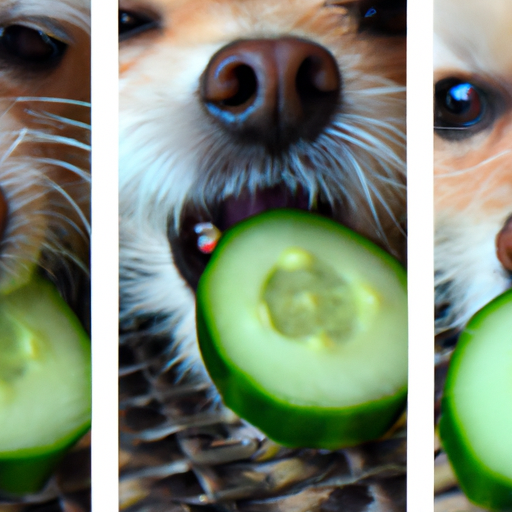If you’ve ever wondered whether it’s safe to share a crisp, refreshing cucumber with your furry best friend, you’re not alone. Many dog owners are curious about whether dogs can eat cucumbers and whether it’s a safe treat option. Well, the good news is that cucumbers can be a healthy and safe addition to your dog’s diet. Not only are they low in calories and packed with essential nutrients, but they can also provide hydration and contribute to a dog’s overall well-being. However, as with any new food, it’s important to introduce cucumbers to your dog’s diet in moderation and pay attention to any potential sensitivities or allergic reactions. Let’s explore the benefits and potential risks of dogs eating cucumbers so you can make an informed decision for your four-legged companion.
Health Benefits of Cucumbers for Dogs
Cucumbers are not only a refreshing and low-calorie snack for humans, but they can also provide several health benefits to our furry friends. Whether you want to offer them as a treat or add them to your dog’s regular diet, cucumbers can be a safe and healthy addition. Let’s explore the various health benefits cucumbers can offer to dogs.
Nutritional Value of Cucumbers
Cucumbers are packed with essential vitamins and minerals that can contribute to your dog’s overall health. They are loaded with vitamin K, vitamin C, potassium, and magnesium. These nutrients are important for maintaining a strong immune system, promoting proper cell function, and supporting bone and muscle health in your canine companion. Additionally, cucumbers are low in calories and fat, making them an excellent option for dogs on a weight management plan.
Hydration
One of the significant benefits of cucumbers for dogs is their high water content. Staying hydrated is vital for dogs, especially during hot summer months or after vigorous exercise. Offering your dog cucumbers can help keep them hydrated and prevent conditions such as dehydration and heatstroke. So not only do cucumbers provide necessary moisture, but they also add a refreshing crunch to your dog’s snack time.
Digestive Health
Cucumbers can contribute to healthy digestion in dogs. Thanks to their high fiber content, cucumbers can aid in regulating bowel movements and prevent constipation. Fiber promotes healthy gut flora and regulates the digestion process. It can also reduce the risk of digestive issues such as diarrhea. Including cucumbers in your dog’s diet may help maintain a healthy digestive system and promote regular bowel movements.
Weight Management
If your furry friend is prone to weight gain or needs to shed a few pounds, cucumbers can be a valuable addition to their diet. Being low in calories and high in water content, cucumbers can satisfy a dog’s hunger without adding unnecessary calories. They can be a healthy alternative to high-calorie treats or snacks. However, it’s important to remember that weight management involves a balanced diet and regular exercise, so consult with your veterinarian for a personalized plan for your dog.
Dental Health
Chewing on cucumbers can contribute to good dental health for dogs. The crunchiness of cucumbers can help remove plaque and tartar buildup on your dog’s teeth, promoting fresh breath and healthy gums. Chewing cucumbers can also provide a stimulating activity for your canine companion, keeping them occupied and entertained. However, it’s important to note that while cucumbers can contribute to dental health, they should not replace regular teeth brushing or professional dental cleanings.
Potential Risks and Precautions
While cucumbers offer numerous health benefits, it’s important to be aware of potential risks and take precautions when feeding them to your dog.
Allergies
Just like humans, dogs can have food allergies or sensitivities. Although cucumbers are not commonly associated with allergies in dogs, it’s still possible for some dogs to have an adverse reaction. If you are introducing cucumbers to your dog’s diet for the first time, monitor them closely for any signs of an allergic reaction such as itching, skin rashes, or gastrointestinal issues. If you suspect your dog is allergic to cucumbers, consult with your veterinarian for guidance.
Digestive Issues
While cucumbers can aid in promoting healthy digestion in most dogs, some may experience digestive issues when introduced to this new food. Introduce cucumbers gradually into your dog’s diet and observe their response. If you notice any signs of upset stomach, diarrhea, or gastrointestinal discomfort, it may be a sign that cucumbers do not agree with your dog’s digestive system. In such cases, it’s best to discontinue feeding cucumbers and consult with your veterinarian.
Pesticides and Chemicals
When offering cucumbers to your dog, it’s essential to consider the potential presence of pesticides or chemicals. Non-organic cucumbers may have been treated with pesticides that can be harmful to dogs if ingested in large amounts. Always choose organic cucumbers whenever possible or thoroughly wash conventionally grown cucumbers to reduce the risk of pesticide exposure. Removing the peel of the cucumber can also help eliminate any potential pesticide residue.
Choking Hazard
While cucumbers are generally safe for dogs to consume, it’s important to take precautions to prevent choking. Ensure that the cucumbers are cut into small, bite-sized pieces, especially for small or toy breeds. Supervise your dog while they eat cucumbers to prevent them from swallowing large chunks without chewing adequately. If your dog tends to gulp down food quickly, consider mashing or pureeing cucumbers to minimize the risk of choking.
How to Feed Cucumbers to Dogs
Now that we understand the health benefits and potential risks of cucumbers for dogs, let’s explore the best practices for feeding them to your furry friend.
Wash and Slice
Before feeding cucumbers to your dog, thoroughly wash them to remove any dirt or potential pesticide residue. Once washed, slice the cucumber into small, manageable pieces. Some dogs might prefer peeled cucumbers, while others will enjoy the crunchiness of the skin. Ensure that the slices are appropriately sized for your dog, considering their breed and size.
Raw or Cooked
Cucumbers can be fed to dogs in both raw and cooked forms. Raw cucumbers retain their maximum nutritional value and provide a satisfying crunch. Cooked cucumbers might be more suitable for dogs with sensitive stomachs, as cooking softens the texture and makes them easier to digest. However, avoid cooking cucumbers with oils, seasonings, or additives that might not be safe for dogs.
Moderation
As with any treat or addition to your dog’s diet, moderation is key. While cucumbers are generally safe for dogs, they should be offered in moderation to prevent any digestive upsets. If you are incorporating cucumbers into your dog’s regular diet, consult with your veterinarian to determine the appropriate portion size based on their specific needs. As a general guideline, treats should not constitute more than 10% of your dog’s daily calorie intake.
Introducing Cucumbers to Dogs
When introducing cucumbers to your dog for the first time, it’s best to start with small quantities to assess their response. Mix a small piece of cucumber with their regular food or offer it as a separate treat. Observe their reaction and monitor for any signs of allergies or digestive issues. If all goes well, gradually increase the amount of cucumber over a few days.
Using Cucumbers as Treats
Cucumbers can be a healthy alternative to processed treats or high-calorie snacks. You can offer small cucumber slices as a reward during training sessions or as a low-calorie snack between meals. Some dogs might enjoy the crunchiness of frozen cucumber slices during hot summer days. Just remember to adjust your dog’s daily calorie intake accordingly to maintain a balanced diet.
Alternatives to Cucumbers for Dogs
While cucumbers have many health benefits, not all dogs might enjoy them or tolerate them well. Here are some safe alternatives to cucumbers that you can consider for your furry friend.
Safe Vegetables for Dogs
If cucumbers don’t appeal to your dog or they prefer different textures and flavors, there are several other vegetables that can provide similar health benefits. Carrots, green beans, and zucchini are excellent options. These vegetables can be served raw, steamed, or cooked, depending on your dog’s preferences.
Fruits for Dogs
In addition to vegetables, many fruits offer health benefits and can be enjoyed by dogs. Some suitable fruits for dogs include apples, blueberries, strawberries, and watermelon. Remember to remove any seeds or pits and offer fruits in moderation due to their natural sugar content.
Other Healthy Dog Treat Options
If your dog is not a fan of cucumbers or you’re looking for variety, there are numerous commercially available dog treats formulated to promote good health. Look for treats made with natural ingredients, limited additives, and appropriate for your dog’s specific dietary needs. Always read the labels and consult with your veterinarian before introducing new treats to your dog’s diet.

What Experts Say
When it comes to feeding cucumbers or any new food to your dog, it’s always wise to consider expert opinions. Here’s what veterinarians and canine nutritionists have to say about cucumbers for dogs.
Veterinarian Recommendations
Many veterinarians agree that cucumbers can be a healthy addition to a dog’s diet when fed in moderation. They emphasize the importance of washing and slicing cucumbers appropriately and monitoring dogs closely for any adverse reactions. As with any treat, ensuring that cucumbers are part of a balanced diet is crucial.
Canine Nutritionists’ Opinion
Canine nutritionists generally support the inclusion of cucumbers in a dog’s diet. They highlight the nutritional value, hydration benefits, and low-calorie nature of cucumbers. However, they also stress the importance of considering individual factors such as a dog’s allergies, sensitivities, and specific dietary requirements when deciding to feed cucumbers.
Cucumber-Based Dog Treat Recipes
If you enjoy making homemade treats for your furry companion, here are a few cucumber-based recipes that you can try.
Cucumber Frozen Yogurt Treats
Ingredients:
- 1 cup plain, unsweetened yogurt
- 1 small cucumber, pureed
- 1 tablespoon honey (optional)
Instructions:
- In a bowl, combine yogurt and pureed cucumber.
- If desired, add honey for a touch of sweetness.
- Pour the mixture into ice cube trays or silicone molds.
- Freeze until solid.
- Serve one frozen treat as a refreshing snack for your dog.
Cucumber and Chicken Bites
Ingredients:
- 1 small cucumber, sliced into bite-sized pieces
- 1 cup cooked chicken breast, shredded or diced
Instructions:
- Preheat the oven to 350°F (175°C).
- Place the cucumber slices on a baking sheet.
- Top each cucumber with a small amount of shredded or diced chicken.
- Bake for 10-15 minutes or until the chicken is heated through.
- Allow the bites to cool before serving them as a delicious and nutritious treat.
Cucumber and Peanut Butter Cookies
Ingredients:
- 1 small cucumber, grated
- 1 cup oat flour (made by grinding rolled oats)
- 1/4 cup natural peanut butter (no added salt or sugar)
Instructions:
- Preheat the oven to 325°F (163°C).
- In a bowl, combine the grated cucumber, oat flour, and peanut butter.
- Mix until well combined and forms a dough-like consistency.
- Roll the dough into small balls and flatten them with the back of a spoon.
- Place the cookies on a baking sheet lined with parchment paper.
- Bake for 15-20 minutes or until the edges are golden brown.
- Allow the cookies to cool completely before serving them as a tasty homemade treat.
Cucumber Allergy in Dogs
While cucumber allergies are relatively rare in dogs, it’s important to be aware of the symptoms and take necessary precautions.
Symptoms of Cucumber Allergy
If your dog is allergic to cucumbers, they may display various symptoms such as itching, redness or inflammation of the skin, hives, vomiting, diarrhea, or difficulty breathing. If you notice any of these signs after feeding cucumbers to your dog, it’s crucial to consult with your veterinarian for a proper diagnosis.
Allergy Testing for Dogs
If you suspect that your dog has a cucumber allergy, your veterinarian may recommend allergy testing to identify the specific allergen. This can help determine whether it’s cucumbers or another ingredient causing the allergic reaction. Allergy testing can be performed through blood tests or intradermal skin testing, depending on your veterinarian’s recommendation.
Treating Cucumber Allergies
To manage cucumber allergies in dogs, it’s best to avoid feeding them cucumbers altogether. Your veterinarian may prescribe antihistamines or other medications to alleviate symptoms if they occur. It’s essential to follow your veterinarian’s advice and closely monitor your dog’s diet and environment to prevent exposure to any potential allergens.
Summary
In conclusion, cucumbers can indeed be a safe and healthy treat option for dogs. They provide several health benefits, including hydration, digestive health, weight management, and dental hygiene. However, it’s important to introduce cucumbers gradually and in moderation, as individual dogs may have different tolerances and preferences. Always wash cucumbers thoroughly, choose organic options whenever possible, and cut them into appropriate sizes to minimize the risk of choking. Pay attention to any signs of allergies or digestive issues and consult with your veterinarian if needed. With proper care and consideration, cucumbers can be a delightful and nutritious addition to your dog’s diet.







